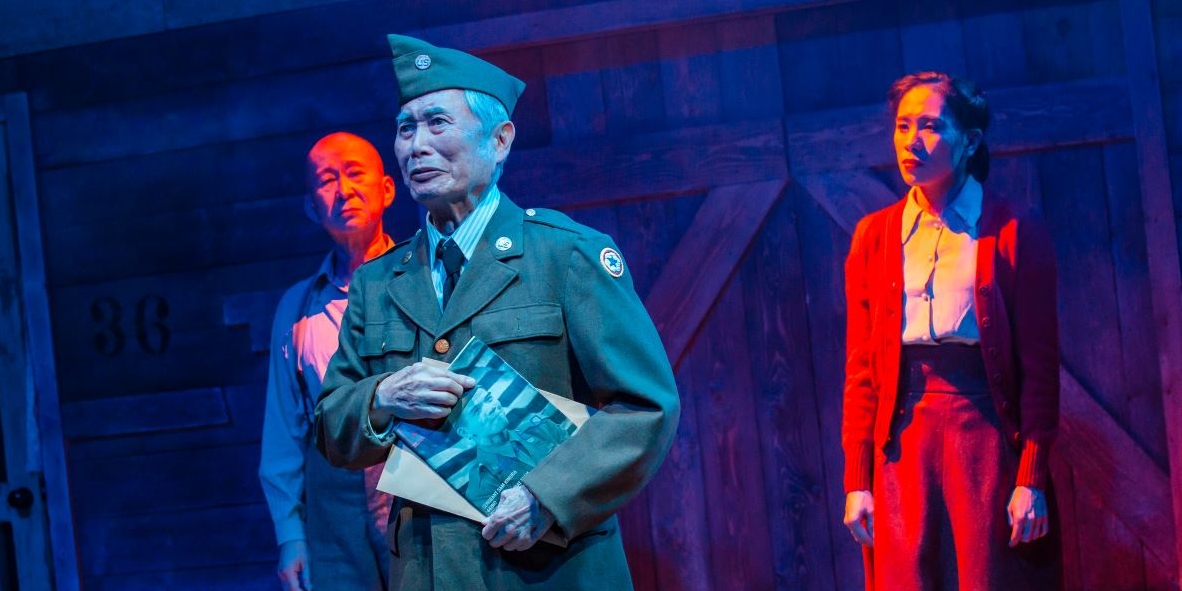If it’s possible to fall in love with a voice, then count me well and truly smitten with the mellifluous tones of Telly Leung, the ‘star’ of Allegiance, now playing at The Charing Cross Theatre.
When I say ‘star’ I clearly mean in terms of being the protagonist, and the leading man. However, in terms of pulling power there’s no doubt whose show this really is: the wonderful Mr George Takei; Actor; Activist; Writer; Social Media Sensation; Legend; And now, at the age of 85, the hottest draw in the West End.
Billed as ‘George Takei’s Allegience’ the show is loosely based on Mr Takei’s own experience of being interned in 1942, along with his family, at the age of five as an enemy alien– due to his Japanese heritage – following the bombing of Pearl Harbour. Full credit must go to him therefore for making this his ‘legacy project’, and bringing a hitherto little-known moment of American history to the stage.
Although I have a couple of reservations about the piece – more of which later – it’s an enjoyable evening, at turns funny, and even manages at times to be genuinely moving, though I didn’t quite shed a tear.
Sam Kimura (a gruff George Takei) receives a visitor bringing him a gift which unlocks his memories of times past, and we are transported back to 1942 where the young Sammy Kimura (Telly Leung) is just starting out in life and full of hope – a hope cut all too short by America’s entry into World War II.
What plays out next is a tale of love, loss, and family histories all building to the one inevitable question, where should our allegiances lie?
It’s an interesting tale, and there are some standout performances other than Mssrs Takei and Leung. Aynrand Ferrer as Sammy’s sister, Kei gives us full-on belt, and I think I have a soft spot for Masashi Fujimoto, as Sammy’s father.
The traverse staging is some of the best I’ve seen at The Charing Cross theatre, and the choreography too is slick and well used, credit for both of which must go to director Tara Overfield Wilkinson.
A nod too to Nic Farman for some very evocative lighting that really helps set the mood.
So, my reservations… Although the score is incredibly egalitarian, with almost everybody getting a song and a chance to shine – and virtually all of them have the chance to belt – the music itself is rather featureless. By that I mean that it’s perfectly good as it passes by, and serves its purpose, but you’d be hard-pressed to find an actual memorable ‘tunes’ in all of that melody.
I wonder if it might possibly be because of the density of the book. There’s a lot that happens, and a lot of threads to follow simultaneously, and I’m not convinced that they’re either all necessary or should be given equal prominence.
The other big stumbling block for me is the lack of a clearly defined want and character arc for the protagonist, Sam/Sammy. Again, that may be a feature of having everything including the kitchen sink thrown into the mix, and that by extension may well be because of the number of people involved in creating the book: Marc Acito, Lorenzo Thione, and Jay Kuo.
No matter. These are relatively minor quibbles on what is an entertaining and moving telling of an important story. All credit to George Takei in using his undoubted pulling power to get it told, though I wonder what life might await it shorn of the magic his presence brings?

